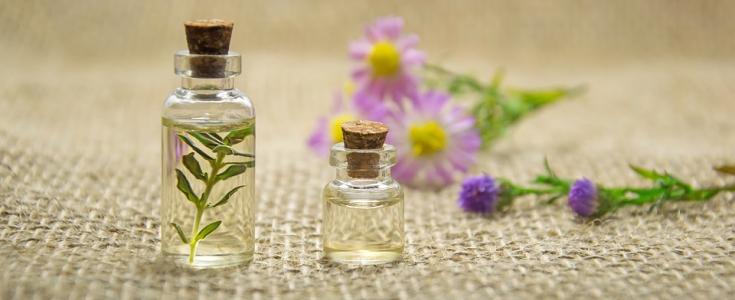Aromatherapy Can Help Your Anxiety
Aromatherapy for anxiety may be a useful natural remedy in helping ease symptoms. Aroma means a pleasant or agreeable odor arising from plants, flowers or spices. Combined with the word, therapy or (the remedial treatment of physical or mental disorder), gives us the true definition of the word aromatherapy: A healing that involves the use of aromatic essences, or essential oils of plants.
The benefits of using essential oils in your life on a regular basis is a pleasurable way to increase your physical, emotional, and spiritual well being.
Aromatherapy for anxiety can improve your complexion, stimulate creativity, reduce stress and help you to sleep calmly. Essential oils can help relieve the symptoms of anxiety.
By creating healthy changes in your life, along with a healthy diet, eliminating caffeine and sugar, and becoming physically active, you will be able to have a healthier state of mind and also eliminate the feelings of anxiety. These feelings will be replaced with a feeling of peace and tranquillity.
Aromatherapy for anxiety can help one to embrace their thoughts with comfort and softness and at the same time, embrace feelings. This is a science of translating smell of the aroma to a positive thought of what the oil reminds us of. Your sense of smell has the capability of traveling into the part of the limbic brain that is the base of our emotions and memories.
Using aromatherapy for anxiety in the bath is the easiest and most pleasant way to benefit from it. A simple technique of taking an aromatic bath can be quite relaxing. The method of preparing an aromatic bath is very simple: After a busy day, add three to six drops of your favorite essential oil, and two tablespoons of a carrier oil in a full tub of water.( Do not prepare the bath in advance) Blend by swishing with your hands. Get in the water, breathe deeply, and softly, and relax.
You can also put a couple of drops of your favorite essential oil on a pillow so you can have direct inhalation while you sleep.
Buying The Best Aromatherapy Oils
Not every scented oil in stores contain a healing ability. Here are five tips to help you shop around for the best finds in aromatherapy products.
1: Make sure to research each aromatherapy oil you want to buy. Every aromatherapy oil has different therapeutic uses and quality. For instance, Roman, Lavender, German Chamomile, Patchouli are great for relaxation, anxiety, and depression. For help in finding a paticular oil that fits your needs you may want to do some research, and also buy or search the internet for a aromatherapy for anxiety guide.
2: Aromatherapy products do have expiration dates. If the aromatherapy product you want has dust on its cap or on its container, then it is best not to get it. If you see dust and dirt on it then the product is more than likely old. Aromatherapy products, oils and solutions age and lose their powerfull healing and aromatic scent.
3: Check the bottle. If the aromatherapy oil is in a plastic bottle or clear bottle, you should not purchase it. Light is damaging to real aromatherapy oils, and can be contaminated when kept in plastic bottles.
4: Make sure to check the label. If the words perfume or fragrance oil are on the container, then the oils contained in the bottle are not pure or real essential oils. Even if you see aromatherapy on the bottle, or the phrase natural identical oil or fragrance oil on the label, then your aromatherapy oil probally contains unwanted chemicals. Pure essential oils often are more expensive than imitation oils.
5: Different types of aromatherapy oils range in price. Pure exotic therapeutic oils cost more than common aromatherapy oils. So make sure to check the price, meaning if every bottle of oil is the same price, you may want to pass.
If you consider using my tips when shopping for your aromatherapy supplies, you can avoid getting ripped off or buying a bad product. In this way you will benifit from real aromatherapy for anxiety.
Scienctific Studies
There have been scienctific studies done that shows evidence of aromatherapy soothing the health problems associated with anxiety, poor sleep, cancer, colds, and much more. The following is short briefing of these studies.
Anxiety
Several small studies report that Lavender aromatherapy helps relieve anxiety. Scientific evidence states there is a small benefit. These studies show the possibility that aromatherapy for anxiety may affect mood, cognitive performance, and relaxation. However, more studies need to be done to confirm this information.
Nausea
Aromatherapy for anxiety has been said to play a role in reducing postoperative nausea. However, the evidence from studies is not clear, and much more research is needed before a clear recommendation can be made.
Congestion, Respiratory Tract Infection
In a small study, done by scientists, a positive effect of aromatics on mucus clearance in patients with chronic airway obstruction was shown. Eucalyptus oil and a component of eucalyptus called eucalyptol were used in the study. These oils can also be found in many over-the-counter vapors and other treatments. Unfortunately, there is not enough scientific information to form a clear conclusion.
Cancer or Life-threatening Illnesses
Aromatherapy and aromatherapy massage are used often with people who have severe illnesses to help improve their quality of life. One trial study, done in a very controlled environment, showed patients sleep scores improved, but anxiety and pain control did not have any improvement. More scientific evidence is needed to form a more accurate conclusion of the effectiveness of aromatherapy for cancer patients and other severe illnesses.
Poor sleep, Sedation
Lavender and chamomile are popular oils and said to be effective sleep aids. However, there is not enough research at this time to form a clear conclusion.
Essential Oils - A Short Guide
A.
Amber - encourages harmony and balance
Angelica Seed - anchoring, restorative, strengthening, and depression
Aniseed - energizing, toning
B.
Balsam Peru - Used on chafed skin to soothe
Basil - deodorant, soothing agent, insect repellent, muscle relaxant
Bay - Amenorrhea, colds, dyspepsia, flu, loss of appetite, tonsillitis
Benzoin - uplifting and soothing
Bergamot - calming, balancing
Birch, Sweet - arthritic and muscular pain and can be a stimulant to circulation
Birch, White - soothing agent, muscle relaxant
C.
Cajeput - antiseptic, deodorant, insect repellent
Camphor - balancing, stimulating, toning, cooling
Cardamom - muscle relaxant, skin conditioner, soothing agent
Carrot Seed - muscle relaxant, soothing agent, skin conditioner, aphrodisiac
Cedarwood, Atlas - eases aches and pains
Cedarwood, Texas - aid nervous tension and stress
Chamomile, Blue - soothing, toning
Chamomile, Roman - calming
Cinnamon Leaf - stimulating, energizing
Cistus - stimulating, toning, soothing
Citronella - soothing aroma type
Clary Sage - balancing, calming, toning
Clove Bud - stimulating, energizing
Coriander - warming, stimulating
Cypress- stimulating
D.
Dill - reduce appetite
E.
Elemi - nervous exhaustion
Eucalyptus - toning, stimulating
Eucalyptus (organic) - deodorant, antiseptic, soothing agent, skin conditioner, insect repellent
Eucalyptus Citriodora - air freshener and good for clearing
Eucalyptus Radiata - respiratory infections.
Eucalyptus Smithii - painful joints and muscles
F.
Fennel Essential - energizing, toning
Fir Needle - the aroma of a Christmas tree
Fir Silver Needle - refresh the aroma of a Christmas tree
Frankincense - stimulating, toning, grounding
G.
Galbanum - skin conditioner, muscle relaxant
Geranium - balancing, soothing skin type: oily, dry
Geranium (organic) - skin refresher, astringent
Ginger - energizing, warming
Grapefruit - energizing
H.
Helichrysum - clear the mind, chest and sinus and relieves aches, pains and menstrual discomfort
Ho Essential Oil - balancing, stimulating, toning, cooling
Hyssop - warming, stimulating, balancing
J.
Jasmine - uplifting, balancing
Juniper Berry (organic) - energizing
K.
Kanuka - For the relief of swelling and muscular pain, for sprains, strains and sports injuries
L.
Lavandin - soothing agent, muscle relaxant, skin conditioner, astringent
Lavandin (organic) - stimulating, energizing
Lavender 40/42 - calming, balancing, soothing
Lavender, E. Europe - calming, balancing, soothing
Lavender, High Alpine - muscle relaxant, soothing agent
Lavender, Provence (organic) - calming, balancing, soothing
Lemon - energizing, uplifting
Lemon (organic) - antiseptic, soothing agent
Lemongrass - calming
Lime - energizing, uplifting
Linden Blossom Absolute - calming and stress reduction and a tonic for the nervous system
M.
Mandarin, Red - calming
Mandarin, Red (organic) - soothing agent, astringent, skin conditioner
Manuka - muscular pain relief
Marjoram - calming
Marjoram, (organic) - calming
Melissa - uplifting effect on mind and body
Myrrh - toning, stimulating, soothing
N.
Neroli - antiseptic, emollient
Niaouli - body aches and pains
Nutmeg - energizing, stimulating, warming
O.
Oak Moss Absolute - calming
Orange - astringent, soothing agent, skin conditioner
Orange, (organic) - calming
Oregano - relieves muscle aches and pains and assists in increasing energy
P.
Palmarosa - insect repellent, skin conditioner, soothing agent, emollient, muscle relaxant
Patchouli - anti-inflammatory agent, antiseptic, astringent, aphrodisiac, perfume
Pepper, Black - muscle relaxant, aphrodisiac
Peppermint - energizing, stimulating
Peppermint (organic) - insect repellent, emollient, antiseptic, muscle relaxant
Petitgrain - calming
Pine Needle (Scotch Pine) - It has a deodorant affect and is often used in commercial preparations
R.
Ravensara - loosening tight muscles, relieving menstrual discomfort and aches and pains
Rose Absolute - cooling, balancing, calming, toning
Rose Geranium - balancing, soothing skin type: oily, dry
Rose Otto - cooling, balancing, calming, toning
Rosemary - antiseptic, muscle relaxant, soothing agent, skin conditioner
Rosewood - Relaxing and deodorizing
S.
Sage - soothing agent
Sandalwood - calming, grounding
Scotch Pine (Pine Needle) - Stimulates, refreshes and cleanses
Spearmint - calming
Spearmint (organic) - insect repellent, emollient, astringent, soothing agent, muscle relaxant
Spruce - Coughing, depression
T.
Tagetes - Corns, warts
Tangerine - astringent for oily skin
Tea Tree - energizing, stimulating, toning
Tea Tree (organic) - insect repellent, antiseptic
Thyme, Linalool - energizing, stimulating, toning
Thyme, White - energizing, stimulating, toning
V.
Vanilla Absolute - emollient, aphrodisiac
Vetiver - emollient
Y.
Yarrow - chest infections, digestive problems, and nervous exhaustion
Ylang Ylang - calming, balancing
Aromatherapy Guides/Books:
1. The Complete Book of Essential Oils and AromaTherapy
2. The Illustrated Encyclopedia of Essential Oils: The Complete Guide to the Use of Oils in Aromatherapy and Herbalism (Illustrated Encyclopedia)
3. The Fragrant Mind: Aromatherapy for Personality, Mind, Mood, and Emotion
Essential oils may be toxic if taken by mouth and should not be swallowed. Several other adverse effects have been reported, most commonly skin allergy or irritation after direct contact. Some types of aromatherapy may be dangerous in children and in pregnant women. Do not rely on aromatherapy alone to treat potentially dangerous medical conditions. These oils are not intended to diagnose, treat, cure, or prevent any disease. Speak with your health care provider if you are considering the use of aromatherapy.
Photo: Pixabay






